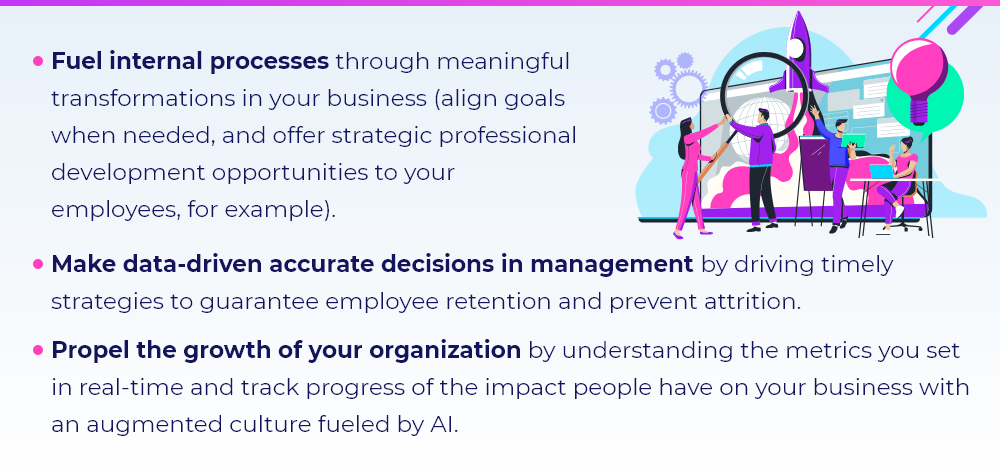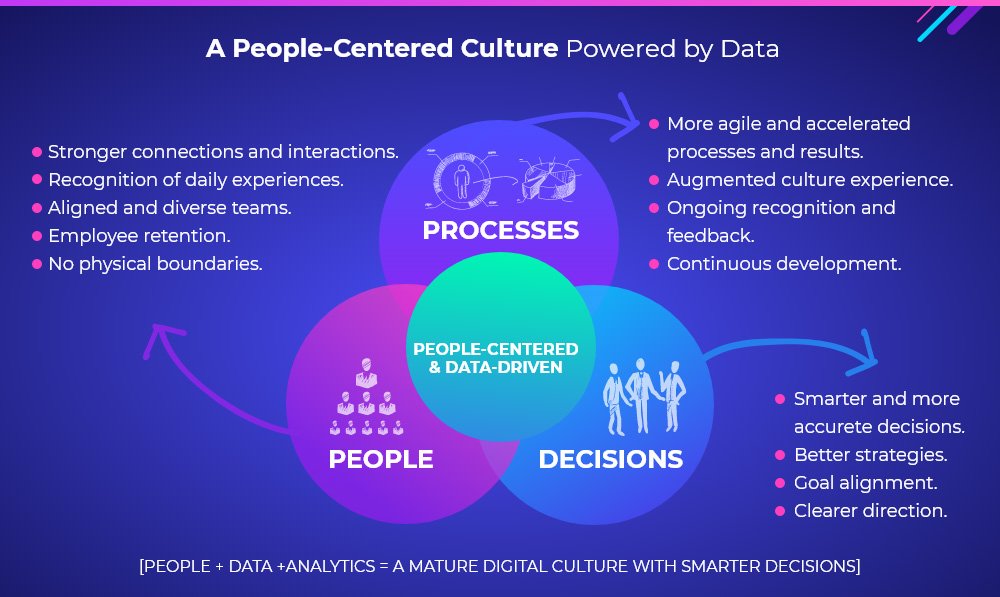Big Data in Companies: Are you making the Invisible Visible?
Written by María Eugenia Raffaele
Is your organization truly leveraging the perks of Big Data? Find out how you can enhance high-performance and make your organizational culture smarter and more human with Big Data.
Big data in companies has been an in-vogue topic in the world of business for some years already. Seeing big data in business as a possibility to transform the industry’s services, products and markets, has sparked massive investments in software to obtain visual analytics that would allow companies to increase their business. In fact, investment in Big Data has spiked sharply since 2016 and it’s expected to reach $274.3 billion worldwide by 2022.
Yes, Big Data seems to be a Big Deal and its value is probably increasing as you’re reading this article, but in a world surrounded by unprecedented amounts of data I can’t help but wonder: Where does the value of big data in business truly lie, and how can companies really make the most of it? The universe of big data in companies can be overwhelming and even misleading. So if you’re looking for ways to make data help you stay competitive and thrive over time, here’s my advice: Use it wisely. Put your human-centric culture first and fully leverage data to discover your cultural blind spots and improve people’s experience and overall performance.

What is Data Science in Business?
Let’s start with a simple definition: Data science in business refers to enormous amounts of complex data sets that are rapidly generated and transmitted to companies from a wide variety of sources and channels. Most organizations then analyze this data to find trends, patterns, or problems, and take actions to improve their services and products, or reinvent their strategies to meet market demands.
Mostly, companies generally use big data and analyze it to:

Having said this, it’s undeniable that the possibility to gain so many insights is a great source of advantage for any organization. So, let’s dig into how Big Data can fuel your organizational culture and success by giving you the insights you need to do what’s best for your people everyday.
A Data-Driven Human-Centric Culture: The Milestone for Success
Nowadays, Big Data in companies allows leaders and top managers to access valuable data that can transform their cultures forever, but many don’t seem to know how to make the most of it.
Corporate success doesn’t lie in the amount of data companies can get about competitors, customers’ needs. or market demands. It lies in top managers’ capacity to build insightful and adaptable organizations, made up of engaged teams led by empathic leaders who can drive agile and smart decisions. When you realize that Big Data can help you boost all this by making your culture stronger, then success will be in the palm of your hand.
Make the invisible visible: Big Data Applications to boost your culture
As we have said before, the foundation of corporate success is Culture. We’ve given plenty of insights on how to build a digital organizational culture that puts people first, and the benefits that this type of culture brings to your company. Now, let’s see how the correct big data use can make your organization grow at a human, cultural and business level.
STEP 1: Measure what’s important so you manage what’s important
How much do you know about your employees’ performance? The first thing I suggest you do is this: set KPIs so you can track and measure everything you consider relevant in your organizational culture – this doesn’t mean that you should measure everything that can be measured. However, in order to use data wisely, it is critical that your KPIs represent what really matters to your employees and are tied to your business objectives. For example:

TIP
KPI examples widely used to measure employee engagement include absenteeism, turnover, and the results from employee engagement surveys.
STEP 2: Gain wide visibility
When your KPIs are truly representative of your culture, mission and values, you can now obtain an MRI scan of your organization and visualize the whole picture of the company’s daily dynamics, goal achievements, 360° feedback, people’s level of engagement and their overall performance and needs. Without seeing the whole picture of what really matters, you won’t be able to make a representative diagnosis or analysis of where your organizational culture is really standing.
STEP 3: Analyze relevant data and make better decisions with People-Analytics
Once you obtain and analyze valuable data about all your employees and get to know them deeply, it’s time to take action. By seeing what’s exactly needed, people analytics allows you to obtain real-time data to identify performance issues in time and:

As you can see, there are many uses of big data in companies and its applications shape organizations in different ways. There are many types of organizational cultures and your big data applications will boost the pillars of your own identity. For example, a market culture will focus big data use on its main goals: profit, competitiveness and differentiation. They will mostly measure indicators on the profitability of the final results. Clan or human-centered cultures, on the other hand, will use Big Data to plan strategic actions that would keep people together as a community, putting their needs, collaborative work, recognition and communication first.
In this respect, the technological solution you use to obtain and measure data can also help you determine what you can and should be keeping track of to boost your culture. StarMeUp, for instance, is a digital culture solution and its many HR metrics are focused on enhancing sense of belonging, integration among teams and countries, high-performance, and most connected leaders who collaborate across different roles.

Impact of a Data-Driven Culture on your Company
No matter whether you have a small or big business, when you harness technology and use Big Data to keep track of your cultural pillars, your organization will systematically grow as you get the chance to make smarter people-centered decisions.
TAKEAWAY
The more leaders focus on building a human-centric organization powered by data, the more actionable insights they will get, allowing them to make more effective and timely data-driven decisions.
Let’s see how data can impact your human-centric culture:

As you can see, when the use of big data in companies is destined to optimize your employees’ experience, you can obtain high-performance without micromanaging, your processes will become more agile, and your organizational culture will be more mature and ready for the future.
EMPLOYEES + DATA =
- Stronger connections and more meaningful interactions.
- Valued and visible through recognition of daily tasks.
- Better alignment despite physical distances.
- More objective: As they work with more diverse teams and are open to see ideas coming from different perspectives.
- As emotions are digitized, people’s well-being increases.
- Greater engagement and commitment towards the company’s goals and culture.
PROCESSES + DATA =
- More agile and accelerated.
- Greater visibility of teams> real-time data on people’s performance allows continuous development – the right opportunities for the right needs.
- Transforms decision-making.
- Real-time feedback makes daily experiences more meaningful and dynamic
DECISIONS + DATA =
- Smarter, faster, and more accurate decisions and strategies.
- Timely goal alignment – when leaders see employees need to adjust their personal goals with the company’s, they can take action before they start experiencing lack of motivation or lower performance.
- There’s a clearer direction for all teams and leaders across the company
Ready to make Big Data worth it?
As you can see, big data in companies can drive transformative changes as long as it’s used wisely. So, before you become overwhelmed by it, other than putting your effort into building a data-centric organization, I suggest you leverage data to discover your cultural blind spots and work on them everyday to make your company stronger and more competitive over time.